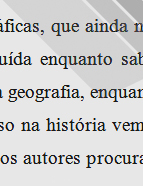

................................
Although not strictly a geographer, Mendes Correia dedicated many of the opening pages of his study Os povos primitivos da Lusitânia (Geografia, Arqueologia, Antropologia) [The Primitive Peoples of Lusitania (Geography, Archaeology, Anthropology)] to the physical characteristics of the territory that would become Portugal. He made some exaggerated claims, such as suggesting that “the ancient spirit of independence” was already vibrant “in the old people of the castros ” (Correia, Os povos [the people] p. 382). Magalhães Basto also began promising geographical research (A fronteira [The border] ), but later abandoned it in favour of history, particularly of Porto. He was described as a “geographer whose career was cut short by the obscurantism that led to the closure of the Faculty of Arts in Porto” (Ribeiro, Opúsculos [Opuscules] V, p. 307). As a result, geographical studies in Porto were limited and discontinued after the Faculty’s closure in 1931.
However, among historians, interest in geography began to develop significantly with the work of Jaime Cortesão. As early as 1930, he asserted that “the determinism of natural conditions, being highly relative, can never be turned into geographical fatalism” (Cortesão, "O problema" ["The problem"] p. 227). Cortesão consistently incorporated geography into his work, whether in his early studies on Portugal and overseas expansion or later in his research on the Brazilian territory and history. He emphasised the need to consider the “deep harmony within a rich diversity and the perfect polarisation of elements towards an Atlantic function” in Portuguese territory. He added: “A zone of complex interaction between geographical elements. Further enhanced by the convergence of these features, this territory facilitated the establishment of an economic system based jointly on land exploitation and maritime activity and trade, and consequently had significant potential for political development. .” In Cortesão 's view, the economic foundation of the nation lay in long-distance maritime trade supported by agriculture. Although he was confessedly more focused on history than geography, he had no qualms stating that “it is entirely impossible to understand the origins of the Nation without studying its deep connections with the territory, as well as its entire history in relation to the geography of the Atlantic and the two worlds that frame its basin, and, we could almost say, with universal geography” (Cortesão, "O problema...", pp. 234 and 238).
